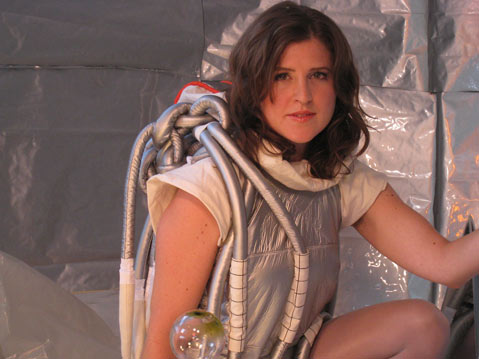The World According to Mirah
Outspoken Songwriter Sings of Past, Present, and Future

Mirah Yom Tov Zeitlyn (simply “Mirah” to the music world) wants to write tunes that resonate with the times, and song titles like “The World Is Falling,” “Gone Are the Days,” and “While We Have the Sun” certainly don’t hide her worldview. Her forth album, (a)spera, released March 10, depicts post-apocalyptic images reminiscent of W.B. Yeats’s “The Second Coming” and is informed, at least in part, by books like Jared Diamond’s Guns, Germs, and Steel. The album portrays the world, as Mirah put it, as a “tightly wound ball” of difficulties and hopes, an idea that the Latin-based title, meaning hardships, implies.
(a)spera, the Portland, Oregon-based singer/songwriter recently explained, was no easy feat, partly because she felt so emotionally stifled by the nation’s political climate. However, a catalyst came with “the end of the Bush era,” a phrase she yelled jubilantly via phone. “It was just a very life-sucking period for the world,” she said of the recently departed administration. “I’m so glad that that’s over, even though the reverberations of it are still clanging around and will be for a while. I kind of feel like, if that had gone on much longer, I wouldn’t have been able to make anything again.”
Asked whether the world seems less bleak now that Barack Obama is in the White House, she sighed, “I wish I felt that way.” It’s a statement that mirrors her lyric: “If things are getting better, what’s that crashing down the street?”
Mirah became interested in politics early on in life. At age 12, her then 10-year-old cousin inspired her to take off six weeks from school and join the Great Peace March, during which she marched from Harrisburg, Pennsylvania, (her home state) to Washington, D.C. “The whole mechanism of the march was very inspiring to me as a community movement,” she explained. “It was very altruistic-like an ant community. Everyone had their role, and therefore, as a group, the march functioned really effectively, and that was very informative to me.”
Jewish and openly gay, Mirah is now a reluctant spokesperson for her communities and causes. Though outspoken and often blunt with her opinions, she attests to being nervous during interviews and hates to explain the meanings of her lyrics.
Though her own coming out experience was a smooth one, and both her and her girlfriend’s families are strong allies, Mirah feels a sense of outrage on behalf of her community, especially after the sting of Proposition 8. “It just sucks,” she lamented. “It’s so shocking to me that people can vote against us. It really gets me.”
Her parents, whom Mirah described as “kind of hippies,” raised her on a massive diet of music. She grew up singing along with her dad to their huge music collection, and was exposed to everything from Sun Ra to Duran Duran to Leonard Cohen, though her sound now gravitates mainly toward folk. “Basically, my musical upbringing ran the gamut of styles,” she recalled. “I think a lot of it was rooted in the American folk music tradition. We would go to the Philadelphia Folk Festival every year-every year for 15 years when I was growing up.”
Not bound by tradition, Mirah often likes to throw unexpected instrumentation into the mix. On the song “Shells,” she sings to the accompaniment of the Mandinka kora, an African harp-like instrument. Music is like a conversation between her and her instruments, she explained, and she doesn’t let the rules of her genre restrict the exchange.
Despite her success, Mirah feels uncomfortable with the public persona she feels she must inhabit. “I’d rather reach people directly through my music and then, when I’m not reaching people directly through my music, have my small life here and be involved with whatever I chose to be involved with in a more anonymous way.”
4•1•1
Mirah will play an all-ages show at SOhO (1221 State St.) this Wednesday, April 8, at 8:30 p.m. Call 962-7776 or visit clubmercy.com for details and ticket information.



